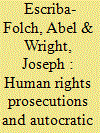| Srl | Item |
| 1 |
ID:
152230


|
|
|
|
|
| Summary/Abstract |
Do elections reduce or increase the risk of autocratic regime breakdown? This article addresses this contested question by distinguishing between election events and the institution of elections. The authors propose that elections stabilize autocracies in the long term but at the price of short-term instability. Elections are conducive to regime survival in the long run because they improve capacities for co-optation and repression but produce short-term instability because they serve as focal points for regime opposition. Drawing on data from 259 autocracies from 1946 to 2008, the authors show that elections increase the short-term probability of regime failure. The estimated effect is retained when accounting for the endogeneity of autocratic elections; this finding is critical, since some autocrats may or may not hold elections because of perceived effects on regime survival. The authors also find that this destabilizing effect does not operate in the long term. They find some, although not as strong, evidence that elections stabilize autocratic regimes in the medium to long term, despite their destabilizing immediate effects. These temporal effect patterns are present for both executive and legislative elections, and they are robust to using different measures, control variable strategies, and estimation techniques. In line with expectations, both effect patterns are much clearer for multiparty autocratic elections than for completely uncontested elections.
|
|
|
|
|
|
|
|
|
|
|
|
|
|
|
|
| 2 |
ID:
139799


|
|
|
|
|
| Summary/Abstract |
Do human rights prosecutions deter dictatorships from relinquishing power? Advances in the study of human rights show that prosecutions reduce repression in transition countries. However, prosecuting officials for past crimes may jeopardize the prospects of regime change in countries that have not transitioned, namely dictatorships. The creation of the International Criminal Court has further revitalized this debate. This article assesses how human rights prosecutions influence autocratic regime change in neighboring dictatorships. We argue that when dictators and their elite supporters can preserve their interests after a regime transition, human rights prosecutions are less likely to deter them from leaving power. Using personalist dictatorship as a proxy for weak institutional guarantees of posttransition power, the evidence indicates that these regimes are less likely to democratize when their neighbors prosecute human rights abusers. In other dictatorships, however, neighbor prosecutions do not deter regimes from democratizing.
|
|
|
|
|
|
|
|
|
|
|
|
|
|
|
|